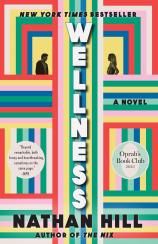Excerpt
Excerpt
Wellness

Come With
He lives alone on the fourth floor of an old brick building with no view of the sky. When he looks out his window, all he can see is her window—across the alley, an arm’s length away, where she lives alone on the fourth floor of her own old building. They don’t know each other’s names. They have never spoken. It is winter in Chicago.
Barely any light enters the narrow alley between them, and barely any rain either, or snow or sleet or fog or that crackling wet January stuff the locals call “wintry mix.” The alley is dark and still and without weather. It seems to have no atmosphere at all, a hollow stitched into the city for the singular purpose of separating things from things, like outer space.
She first appeared to him on Christmas Eve. He’d gone to bed early that night feeling horribly sorry for himself—the only soul in his whole raucous building with nowhere else to be—when a light snapped on across the alley, and a small warm glow replaced his window’s usual yawning dark. He sat up, walked to the window, peeked out. There she was, a flurry of movement, arranging, unpacking, pulling small vibrant dresses from large matching suitcases. Her window was so close to him, and she was so close to him—their apartments separated by the distance of a single ambitious jump—that he scooted back a few feet to more fully submerge himself in his darkness. He sat there on his heels and stared for a short while, until the staring felt improper and indecent and he contritely returned to bed. But he has, in the weeks since, come back to the theater of this window, and more often than he’d like to admit. He sometimes sits here, hidden, and, for a few minutes at a time, he watches.
To say that he finds her beautiful is too simple. Of course he finds her beautiful—objectively, classically, obviously beautiful. Even just the way she walks—with a kind of buoyancy, a cheerful jaunty bounce—has him thoroughly charmed. She glides across the floor of her apartment in thick socks, occasionally doing an impromptu twirl, the skirt of her dress billowing briefly around her. In this drab and filthy place, she prefers dresses—bright flowered sundresses incongruous amid the grit of this neighborhood, the cold of this winter. She tucks her legs under them as she sits in her plush velvet armchair, a few candles glowing nearby, her face impassive and cool, holding a book in one hand, the other hand idly tracing the lip of a wineglass. He watches her touch that glass and wonders how a little fingertip can inspire such a large torment.
Her apartment is decorated with postcards from places he assumes she’s been—Paris, Venice, Barcelona, Rome—and framed posters of art he assumes she’s seen in person: the statue of David, the Pietà, The Last Supper, Guernica. Her tastes are manifold and intimidating; meanwhile, he’s never even seen an ocean.
She reads inordinately, at all hours, flicking on her yellow bedside lamp at two o’clock in the morning to page through large and unwieldy textbooks—biology, neurology, psychology, microeconomics—or various stage plays, or collections of poetry, or thick histories of wars and empires, or scientific journals with inscrutable names and bland gray bindings. She listens to music he assumes is classical for the way her head sways to it. He strains to identify book jackets and album covers, then rushes to the public library the next day to read all the authors that rouse and unsleep her, and listen to all the symphonies she seems to have on repeat: the Haffner, the Eroica, the New World, the Unfinished, the Fantastique. He imagines that if they ever actually speak, he will drop some morsel of Symphonie Fantastique knowledge and she will be impressed with him and fall in love.
If they ever actually speak.
She’s exactly the kind of person—cultured, worldly—that he came to this frighteningly big city to find. The obvious flaw in the plan, he realizes now, is that a woman so cultured and worldly would never be interested in a guy as uncultured, as provincial, as backward and coarse as him.
Only once has he seen her entertain a guest. A man. She spent an appalling amount of time in the bathroom before he arrived, and tried on six dresses, finally picking the tightest one—a purple one. She pulled her hair back. She put on makeup, washed it off, put it back on. She took two showers. She looked like a stranger. The man arrived with a six-pack of beer and they spent what seemed like an awkward and humorless two hours together. Then he left with a handshake. He never came back.
Afterward, she changed into a ratty old T-shirt and sat around all evening eating cold cereal in a fit of private sloth. She didn’t cry. She just sat there.
He watched her, across their oxygenless alley, thinking that she was, in this moment, beautiful, though that word beautiful seemed suddenly too narrow to contain the situation. Beauty has both public and private faces, he thought, and it is difficult for one not to annul the other. He wrote her a note on the back of a Chicago postcard: You would never have to pretend with me. Then he threw it away and tried again: You would never have to be someone trying to be someone else. But he didn’t send them. He never sends them.
Sometimes her apartment is dark, and he goes about his night—his ordinary, hermetic night—wondering where she might be.
That’s when she’s watching him.
She sits at her window, in the darkness, and he cannot see her.
She studies him, observes him, notes his stillness, his tranquility, the admirable way he sits cross-legged on his bed and, persistently, for hours, just reads. He is always alone in there. His apartment—a desolate little box of unadorned white walls and a cinder-block bookshelf and a futon condemned to the floor—is not a home that anticipates guests. Loneliness, it seems, holds him like a buttonhole.
To say that she finds him handsome is too simple. Rather, she finds him handsome insofar as he seems unaware that he could be handsome—a dark goatee obscuring a delicate baby face, big sweaters disguising a waifish body. His hair is a few years past clean-cut and now falls in oily ropes over his eyes and down to his chin. His fashions are fully apocalyptic: threadbare black shirts and black combat boots and dark jeans in urgent need of patching. She’s seen no evidence that he owns a single necktie.
Sometimes he stands in front of the mirror shirtless, ashen, disapproving. He is so small—short and anemic and skinny as an addict. He survives on cigarettes and the occasional meal—boxed and plastic-wrapped and microwavable, usually, or sometimes powdered and rehydrated into borderline edible things. Witnessing this makes her feel as she does while watching reckless pigeons alight on the El’s deadly electrified lines.
He needs vegetables in his life.
Potassium and iron. Fiber and fructose. Dense chewy grains and colorful juices. All the elements and elixirs of good health. She wants to wrap a pineapple in ribbon. She’d send it with a note. A new fruit every week. It would say: Don’t do this to yourself.
For almost a month she’s watched as tattoos spread ivy-like across his back, now connecting in a riot of pattern and color that’s migrating down his slender arms, and she thinks: I could live with that. In fact, there’s something reassuring about an assertive tattoo, especially a tattoo that’s visible even while wearing a collared work shirt. It speaks to a confidence of personality, she thinks, a person with the strength of his convictions—a person with convictions—contrary to her own everyday inner crisis, and the question that’s dogged her since moving to Chicago: Who will I become? Or maybe more accurately: Which of my many selves is the true one? The boy with the aggressive tattoo seems to provide a new way forward, an antidote to the anxiety of incoherence.
He’s an artist—that much is clear, for he can most often be found mixing paints and solvents, inks and dyes, plucking photo papers out of chemical baths or leaning over a light box inspecting film negatives through a small round magnifier. She’s amazed at how long he can look. He’ll spend an hour comparing just two frames, staring at one, then the other, and then the first again, searching for the more perfect image. And when he’s found it, he circles the frame with a red grease pencil, every other negative is x-ed out, and she applauds his decisiveness: when he chooses a picture, or a tattoo, or a certain bohemian lifestyle, he chooses devotedly. It is a quality that she—who cannot decide on even the simplest things: what to wear, what to study, where to live, whom to love, what to do with her life—both envies and covets. This boy has a mind calmed by high purpose; she feels like a bean jumping against its pod.
He’s exactly the kind of person—defiant, passionate—that she came to this remote city to find. The obvious flaw in the plan, she realizes now, is that a man so defiant and passionate would never be interested in a girl as conventional, as conformist, as dull and bourgeois as her.
Thus, they do not speak, and the winter nights pass slowly, glacially, the ice coating tree branches like barnacles. All season it’s the same: when his light is off, he is watching her; when her light is off, she is watching him. And on the nights she isn’t home, he sits there feeling dejected, desperate, maybe even a little pathetic, and he gazes upon her window and feels like time is zipping away, opportunities gone, feels like he is losing a race with the life he wishes he could lead. And on the nights he isn’t home, she sits there feeling forsaken, feeling once again so bluntly dented by the world, and she examines his window like it’s an aquarium, hoping to see some wonderful thing erupt from the gloom.
And so here they are, lingering in the shadows. Outside, the snow falls plump and quiet. Inside, they are alone in their separate little studios, in their crumbling old buildings. Both their lights are off. They both watch for the other’s return. They sit near their windows and wait. They stare across the alley, into dark apartments, and they don’t know it, but they’re staring at each other.
Excerpted from WELLNESS by Nathan Hill. Copyright © 2023 by Nathan Hill. All rights reserved. No part of this excerpt may be reproduced or reprinted without permission in writing from the publisher.
Wellness
- Genres: Fiction
- paperback: 624 pages
- Publisher: Vintage
- ISBN-10: 0593469836
- ISBN-13: 9780593469835







